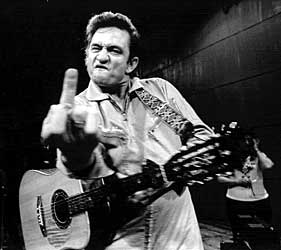...
[Perry's] primary flaw appears to be a chesty, quick-draw machismo that might be right for an angry base but wrong for an antsy country. Americans want a president who feels their anger without himself walking around enraged. ...
Mr. Perry's now-famous gaffes, for which he's been roundly criticized, are said to suggest an infelicity of language. But they look more like poor judgement. On Federal Reserve Chairman Ben Bernanke: "If this guy prints more money between now and the election, I dunno what y'all would do to him in Iowa, but we would treat him pretty ugly down in Texas. Printing more money to play politics at this particular time in American history is almost treasonous in my opinion." On the subject of secession: "We've got a great union. There's absolutely no reason to dissolve it. But if Washington continues to thumb their nose at the American people, you know, who knows what might come out of that." On President Obama's patriotismin response to a question from this newspaper's Danny Yadron, who asked Mr. Perry if he was suggesting that Mr. Obama didn't love this country: 'I dunno, you need to ask him.'" On Mr. Obama's lack of military service: "The president had the opportunity to serve his country I'm sure, at some time, and he made the decision that that wasn't what he wanted to do."
The secession reference was off the cuff, not spoken in a speech that had been fully thought through. Still, to refer blithely to secession, even in that context, as anything but tragicwhich both it and the potential reasons behind it would besuggests a lack of reflection, a lack of gravitas, a carelessness. As for Mr. Bernanke, he is an earnest public servant who is either right or wrong in his assumptions and decisions, but certainly not treacherous or treasonous. ...
A lesson from the Reagan experience:
In 1980 the American electorate was so disturbed by economic disorder that it took a big leap. The leap was Ronald Reagan, the most conservative president since Calvin Coolidge was elected in 1924. Ronald Reagan was not the moderate in the GOP field, he was not the "establishment candidate." It took a real leap to get to him.
The public was able to make the leap for two big reasons. He represented a conservatism that could be clearly asserted, defended and advanced, and which marked a break from the reigning thinking which had gotten us into trouble. And he was a person of moderate temperament and equability. He was good natured, even-keeled, competent and accomplished. Just because he wanted to do some "radical" things didn't mean he would allow a spirit of radicalism to overtake his personality or essential nature.
And this was important in 1980 because Mr. Carter, at the end of the campaign, tried to paint Mr. Reagan as an angry cowboy with crazy ideas. You don't want that guy with his finger on the button.
It was a serious charge. People would listen, and consider whether there seemed to be truth in it. Then Mr. Reagan would walk out on the TV screen and give a speech or an interview and people would see this benign and serious person and think, "He isn't radical. That's not what radical looks like."
They only lept toward him after they looked.
In 2012, the Republican candidate will be called either mean or dumb, or both. Certainly, his politics will be called mean. And if the candidate is Rick Perry, people will look at him and think: Hmmm, is there something to the charge?
He should keep that in mind as he pops off. If there is a deeper, more reflective person there he'd best show it, sooner rather than later. This is the point where out of the corner of their eye, people are starting to get impressions.
That's one of the stupidest things I've ever read, on this board or off, and that's saying quite a bit.


